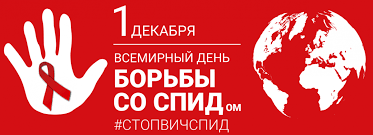The main directions of the campaign dedicated to World AIDS Day 2020 have been announced
INTERNATIONAL SOLIDARITY, SHARED RESPONSIBILITY
World AIDS Day is celebrated annually on December 1. People around the world come together to show support for people living with or affected by HIV and remember those who died of AIDS-related illnesses.
In 2020, the world's attention is focused on the COVID-19 pandemic and its impact on the lives and well-being of people. This pandemic has shown us once again how closely the issue of health is linked to other important issues such as tackling inequality, human rights, gender equality, social protection and economic growth. Unsurprisingly, the theme for World AIDS Day this year is “International Solidarity, Shared Responsibility”.
COVID-19 has clearly demonstrated that in any pandemic, everyone's safety depends on everyone's safety. To be successful, you need to provide help to all who need it. Eradicating stigma and discrimination, taking into account the interests of the population and applying approaches based on human rights and gender equality are the main conditions for ending the HIV and COVID-19 pandemics.
The COVID-19 pandemic has exposed long-entrenched inequalities in our society. This health crisis, like many others, hits the poorest and most vulnerable populations hardest. In particular, it has exacerbated the already serious challenges faced by people living with HIV, women, children and key populations. This includes the problems associated with obtaining vital medical care. In addition, the crisis has increased social and economic inequalities, which in turn increase vulnerability to HIV among marginalized populations. However, this crisis can also be viewed as a wake-up call, as an opportunity to change something for the better through joint efforts. In many ways, ending AIDS as a public health threat depends on whether the world can cope with the COVID-19 pandemic.
Another important factor in the fight against COVID-19 is the active involvement of the population - it is largely thanks to him that we have achieved such successes in the fight against AIDS. It can take a long time to cite examples of situations when public activists and the solidarity of the population helped to provide people affected in one way or another from HIV with the necessary information, services, social protection, and most importantly - to give them hope. Yet such solidarity should not only come from the population. Governments, donors, spiritual leaders, civil society and, finally, each of us should all contribute to the health of the world's population.
COVID-19 also showed how important political will is in this process. Many governments have taken extraordinary political action and mobilized financial resources to save lives and preserve people's livelihoods. States have worked together to ensure the continuity of care for people living with HIV and have supported calls for the COVID-19 vaccine to be "People's Vaccine" available to all equally. As we approach the last decade of working on the plan to end AIDS as a public health threat by 2030, we need political will to achieve this goal. This is quite real.
International solidarity and shared responsibility require us to rethink the international health system, including the AIDS response. Among other things, this approach assumes the fulfillment of the following conditions.
The main directions of the campaign this year:
100% financing of health care.
Strengthening health systems.
Availability.
Respect for human rights.
Respect for the rights and interests of women and children, and ensure gender equality.
For your convenience, the press release is available on the UNAIDS website
